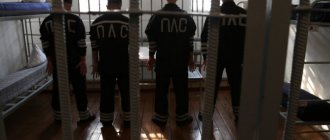According to official data, at the beginning of 2022 in Russia, 602 thousand people were kept in institutions of the penal system. Citizens who have experience of life behind bars number in the millions.
Although the number of prisoners has decreased significantly in recent years, any adult has the opportunity to unexpectedly go to a pre-trial detention center or a police station cell for reposting on a social network, participating in an unauthorized rally, or simply arousing suspicion among security forces with his appearance.
Behind bars, regardless of the length of stay, a detainee, prisoner or convict may face unlawful violence and torture.
To find out how the guards themselves view this problem, Reedus talked with a FSIN employee with extensive service experience in one of the Ural correctional colonies. As a result, the interview is presented in the form of thoughts expressed in the first person.
At the request of the source, the editors do not disclose his personal information.
Torture in the colonies and the rank of general
If in some regions, after the publication of video recordings, criminal cases were initiated against employees of colonies and the local leadership of the Federal Penitentiary Service, dismissals began, in others the problem seemed to go unnoticed. Thus, in the Irkutsk region, after the publication of several videos of violence in pre-trial detention center No. 1, the head of the regional Federal Penitentiary Service, Leonid Sagalakov, not only remained in his post, but was also promoted, receiving the rank of major general.
At the beginning of 2022, Irkutsk investigators reported the closure of four criminal cases of torture, but at the same time, dozens of victims and their defenders publicly stated that investigators want to hush up the overwhelming number of cases and deliberately do not bring charges against employees of colonies and detention centers.
The case of employees of correctional colony No. 46 in the Sverdlovsk region
On March 23, 2022, the Nevyansk City Court found the former head of correctional colony No. 46 of Nevyansk (Sverdlovsk region) and three of his subordinates guilty of the death of a convict, after which other prisoners went on a mass hunger strike. As the investigation established, at the beginning of July 2015, three employees, as well as the head of the colony, beat the convict, and then left him handcuffed to the bars at the entrance to the cell for two days. As a result, the prisoner died. On July 5, more than 400 people serving sentences in the colony went on a hunger strike, demanding an investigation into what happened and the removal of the leadership of the correctional institution. All their demands were satisfied.
During the investigation, it was also established that in November 2012, the head of the colony illegally signed an order appointing his driver to the position of junior inspector of the security department. The driver received a salary, but did not perform work duties, caring for the boss’s personal car. Thus, the regional GUFSIN suffered damage of 124 thousand rublesktq. The defendants in the case were found guilty under Part 4 of Art. 111 of the Criminal Code of the Russian Federation (“Intentional infliction of grievous bodily harm, resulting in the death of the victim through negligence”), Part 3 of Art. 286 of the Criminal Code of the Russian Federation (“Exceeding official powers with the use of violence”), Part 3 of Art. 160 of the Criminal Code of the Russian Federation (“Embezzlement committed using official position”).
The former head of IK-46, Lieutenant Colonel Ilya Chikin, received 13 years and six months in prison, his deputy Lieutenant Colonel Alexey Nikolaev and the head of the security department, Senior Lieutenant Evgeniy Panov, were sentenced to 13 years. Junior inspector of the security department supervision group, senior sergeant Dmitry Usov, received seven years and six months in prison. All convicts were stripped of their titles and sentenced to serve their sentences in a maximum security colony. In addition, they were deprived of the right to hold positions in law enforcement agencies for three years.
Irkutsk colonies and pre-trial detention centers: violence and bullying
They started talking about torture in the institutions of the Federal Penitentiary Service of the Irkutsk Region back in April 2022. Then a riot occurred in colony No. 15 in Angarsk. According to the official version, one of the prisoners provoked a riot, which resulted in a large fire. According to the unofficial version, the reason was torture. DW, with the help of the Foundation for the Defense of Prisoners' Rights, contacted several people who were in the colony during the suppression of the riot. They all agreed to talk about those events on condition of anonymity - they fear pressure from the investigation, which began after the torture became known. Their names in the text have been changed.
In April 2022, a riot broke out in colony No. 15 in Angarsk
“We were taken out (from the territory of the colony - Ed.) sometime after midnight. We lay on the concrete until 9 am, hands behind our heads. We were trampled upon, they didn’t let us get up, they beat us, they mocked us. They called it suppressing the riot,” recalls former prisoner of IK-15 Dmitry in a trembling voice. Then his ribs were broken and his hand was turned backwards. The hand remains deformed to this day. After this, as former prisoners say, about 600 people were taken out and distributed among three institutions: pre-trial detention center-1, pre-trial detention center-6 and IK-6. Their relatives and lawyers could not find them for about six months. In September 2020, the regional Investigative Committee reported that 15 prisoners had been charged with organizing a riot.
“In fact, we were simply tortured all this time. In pre-trial detention center No. 1, a building was ready for our arrival, where in all the cells there were “developers” (prisoners collaborating with the administration and working for the security forces in colonies and pre-trial detention centers. - Ed.), they created “hit brigades.” There were 5-6 people in each cell. We were thrown into these cells one by one, where we were tied up and tortured. It was very scary,” recalls former prisoner of IK-15 Alexey.
Torture by harsh conditions of detention
To put pressure on prisoners, colony administrations came up with several ways to worsen conditions of detention: turning off heating during the cold season and starving them. Nadezhda Tolokonnikova wrote about this from Mordovian IK-14: “It is incredibly cold in the punishment cell. This is an old move, studied by the camp authorities since Soviet times - creating an unbearably low temperature regime in the cells of the punishment cell so that the punishment turns into torture. I sit on a narrow cold bench and write. I have no right to sit on the bed - or even more so to lie on it. Dim cold light, only cold water in the tap.”
Incriminated himself and others: results of torture
Information about regular violence in a conversation with DW was confirmed by several sources in each of the institutions where the “rioters” were taken. According to them, prisoners collaborating with the administration extorted confessions in organizing the riot and unrest in IK-15 and demanded that they incriminate themselves and others.
When simple beatings were not enough, the so-called “developers” resorted to other methods - they forced needles under the prisoners’ nails, beat off their heels with a wire from a kettle and boards, and raped them with improvised objects. The torture continued for months.
“We were forced to speak from a written piece of paper. If we didn't say that, we knew what awaited us. There was this guy in pre-trial detention center-6 (head of the regime department - Ed.) Vasily Lukovsky. He walked, mocked, beat. He bullied me every day except weekends. Every morning he beat and tortured people,” recalls former prisoner Dmitry.
Intimate life in the zone
The conditions for keeping prisoners in prison established by the administration and legislation do not consider the lack of normal sexual relations as a problem. They are not recognized as needs that must be satisfied, unlike food or hygiene.
Married convicts can get a date. The number of visits during the year depends on the regime of detention and the prisoner’s absence of violations of this regime. Ideally, one date every three months. Single people do not have this opportunity. Someone follows the path of getting married in prison. For this purpose, as a rule, brides are found by correspondence. Other convicts satisfy their sexual needs through same-sex intercourse.
In Russian prisons there is a caste of the so-called “lowered ones.” These are people with the lowest status, deprived of many of the rights of other prisoners. The penal colony administrations are not fighting this system of dividing prisoners into “authoritative” and “low-down” ones. In many ways, this is a convenient way to manage prisoners using a hierarchy they themselves created.
Representatives of the lower caste are used not only as servants in the dirtiest jobs (for example, cleaning sanitary facilities), but also to satisfy sexual needs. Often this happens against the will of the people themselves.
Have a question for a lawyer? Ask now, call and get a free consultation from leading lawyers in your city. We will answer your questions quickly and try to help with your specific case.
Telephone in Moscow and the Moscow region: +7
Phone in St. Petersburg and Leningrad region: +7
Free hotline throughout Russia: 8 (800) 301-39-20
But there are also those in the zones who voluntarily provide sexual services. As payment they receive money, tea, cigarettes. Tea and tobacco have replaced money in prisons for decades.
The most active “consumers” of such services are young prisoners and those sentenced to long terms. In the latter case, permanent couples often develop, whose sexual relationship can last for years.
Most prisoners return to heterosexual sexual activity after release.
Life in prison without sex
Some convicts do not support the practice of sexual violence in prison, or the practice of same-sex contact in general.
Such prisoners usually satisfy their needs through masturbation. In women's colonies, various improvised objects are used for masturbation.
Tortured to the point of disability
The violence stopped in December 2022. Then, after being tortured in one of the cells of pre-trial detention center No. 1, prisoner Kezhik Ondar was urgently taken to the hospital. “On the first day they broke his leg, on the second day they shoved a boiler into his anus and turned it on. The boiler, as I understood it, exploded right inside my brother. Terrible injuries, two complex operations were required, but he will still be disabled,” said the prisoner’s sister Aziyana Ondar.
Fire during a riot in colony No. 15 in Angarsk, April 2022
In January 2022, released prisoner Evgeniy Yurchenko spoke about unprecedented torture and rape. After his testimony, the Federal Penitentiary Service of Russia began an investigation into violations of human rights in colonies and detention centers in the Irkutsk region. “Everyone was abruptly taken back to IK-15. Employees from Moscow arrived there, called us in groups of 20 people to the headquarters and started talking to us. Then the convicts told who what was applied to whom. There they began to write statements. Then, naturally, the regional Investigative Committee arrived. An investigation began,” recalls Alexey.
During the same period, the sister of the convicted Takhirzhon Bakiyev told how in IK-6 her brother, who had been shocked from IK-15 after the riot, was “beaten with boards, raped with a mop, thrown under the bunk,” pelted with bags and left for two days. As a result, 10 months after the riot, the Irkutsk Investigative Committee opened several criminal cases of violence and negligence in pre-trial detention center-1, pre-trial detention center-6 and IK-6. A number of employees of institutions found themselves in pre-trial detention centers and under house arrest.
Vicious circle: what is known about the torture of Caucasian residents in the colonies?
THIS MESSAGE (MATERIAL) WAS CREATED AND (OR) DISTRIBUTED BY A FOREIGN MEDIA PERFORMING THE FUNCTIONS OF A FOREIGN AGENT AND (OR) BY A RUSSIAN LEGAL ENTITY PERFORMING THE FUNCTIONS OF A FOREIGN AGENT.
The human rights project Gulagu.net published video evidence of violence in Russian colonies. These materials indicate that many years of complaints about torture in places of serving sentences are not an exaggeration of lawyers and human rights activists. The "Caucasian Knot" has collected information about some high-profile cases of violence and torture against natives of the Caucasus in Russian colonies.
- Saratov Guantanamo
- Yaroslavl torture chamber
- Inquisitors of the Vladimir region
- Other regions
- When Caucasian regions are silent about torture
- How do Russians feel about torture of prisoners?
- Notes
Saratov Guantanamo
Among prisoners in Saratov colonies, the regional tuberculosis hospital (OTB-1) has been known since the 2000s as a place of “re-education” for those who cause trouble to their superiors. The then-current hospital employee, Dmitry Shadrin, publicly spoke about the regular beatings of prisoners back in 2013. “This institution has a reputation for being a torture facility; it is called a “bloody synth.” They mainly send unwanted convicts, complainants, and conflict-ridden people there. In general, prisoners are not taken there for treatment, unfortunately. Since 2012, I have received complaints of torture from prisoners. Now, after the publication of the video, I really hope that the situation has changed,” says Saratov lawyer Snezhana Muntyan.
Regional tuberculosis hospital No. 1, located on the road to the village of Aleksandrovka. It was created in 1998 on the basis of correctional labor colony No. 1, designed for 1,100 beds, as follows from the information on the official website of the Federal Penitentiary Service of Russia for the Saratov region.
A native of Dagestan, Akim Mamiev* has been serving his sentence since 2013 in various colonies in Pskov. I got into OTB-1 in 2020. “I wasn’t sick, but they took me to the prison hospital. They didn’t like me because I spoke out against injustice, beatings and tried to somehow restore order. That's why they didn't like me and took me there. I waited every second to be taken there. Although I was healthy, I didn’t have any illnesses at all,” he said. He was beaten and humiliated for two months. He managed to return to the colony because his brothers from outside stood up.
The United States opened Guantanamo Bay prison in January 2002, which has since become a true symbol of the torture conditions of prisoners.
“This was a whole torture system with the transfer of convicts who had fallen out of favor, their meeting and the subsequent schedule of torture,” says Saratov lawyer Aza Aliyeva. “On the fact of torture and torment, I filed complaints with the Investigative Committee of Russia, the Prosecutor General’s Office of Russia, the prosecutor’s office for the supervision of convicts in the Saratov region, and the Investigative Committee for the Zavodskoy District, the Commissioner for Human Rights. Replies were sent to all complaints that an inspection was carried out and no violations were found,” says Aliyeva.
For several days in April 2022, a native of Azerbaijan, Erik Arzoyev*, was tortured in OTB-1. “They beat him in a group, threw him into a cold shower, twisted his arms and legs, did terrible things to deprive him of his dignity. They tortured him until he cut open his stomach,” said the prisoner’s brother. According to him, Erik Arzoev received revenge for his fight against torture and bullying. Arzoev’s prison term expires in 2022, and he is currently in the Vladimir Central Prison.
After the publication of videos of rape and abuse of prisoners in a prison hospital, 18 employees were fired from the Office of the Federal Penitentiary Service in the Saratov Region, said the acting head of the Federal Penitentiary Service for the region, Anton Efarkin. And on November 16, Russian Prosecutor General Igor Krasnov announced the initiation of 12 criminal cases based on these facts.
Sochi resident Alexander Mukhortov, who previously served a sentence in the Saratov region, also complained about torture in the Saratov prison hospital. He claims that both he and other convicts were tortured in the hospital in the colony. “I saw people being tortured and killed. My first event was the murder of [prisoner] Danila Putin in the colony,” Mukhortov said. After speaking in the media about torture, the prisoner complained that he began to receive threats.
Yaroslavl torture chamber
In March 2022, lawyers reported on ten defendants in the case of torture of Caucasians in the Yaroslavl colony. Three suspects in the beating of Chechen native Abubakar Tsagalayev (in 2016) and Georgian citizen Vazha Bochorishvili (in 2022) in the Yaroslavl colony were arrested. Two more were under house arrest, but the court later decided to release them on their own recognizance.
A native of the Krasnodar Territory, Ruslan Vakhapov, was beaten in Yaroslavl correctional colony No. 1 and kept under constant penalties, ending with a tougher regime. “Beatings in a colony are everyday life,” says Ruslan, and calls the colony an exterminator, not a correctional one.
Human Rights Commissioner in Russia Tatyana Moskalkova called the actions of Sergei Savelyev, who collected and removed the torture video archive from the zone, a manifestation of courage in confronting “this ugly phenomenon.”
On January 17, 2022, the court found guilty the former inspector of the security department of the Yaroslavl colony, Maxim Yablokov, and sentenced him to 3.5 years in prison. The inspector was accused of beating Khasdin Murtazaliev, a native of Chechnya, in 2016.
The other defendants in the torture case, former employees of IK-1 Dmitry Nikitenko and Sardor Ziyabov, were sentenced to three and four years in a general regime colony, respectively. In 2016, they forced Artur Ghukasyan and other prisoners to run along the corridor, beating them and shouting “The gophers are running.”
On November 11, the Zavolzhsky District Court of Yaroslavl ruled on the claims of two former prisoners of IK-1 and decided that compensation of 65 thousand would be sufficient for Khasdin Murtazaliev, and 50 thousand rubles for Artur Gukasyan.
Inquisitors of the Vladimir region
A native of Chechnya, Maharbi Tosuev stated that he repeatedly signed confessions of committing crimes under torture. In 2006, the Supreme Court of Chechnya sentenced Tosuev to 14 years in prison. He served his sentence in IK-4 in the Arkhangelsk region. In 2022, he was transferred to IK-7 in the Vladimir region. There, the prisoner admitted to encroaching on the life of a policeman (Article 317 of the Criminal Code), after which Tosuev’s sentence was increased to 17.5 years in prison, having been found guilty of participation in an armed group and the murder in 2002 of an employee of the Nogai district department of the Ministry of Internal Affairs of Dagestan.
Ombudsman Moskalkova reported on the draft law being prepared on facts of torture in colonies.
“We, together with the Federation Council, are now preparing a bill to create a separate body for torture with appropriate penalties,” she said on October 14 .
After the verdict, Tosuev was returned to IK-7, where in the summer of 2022 he confessed that he was involved in the attack in May 2002 on the official car of the Shelkovsky District Department of Internal Affairs of Chechnya. Unable to withstand the torture, Tosuev stuck a nail in his stomach, and he was transferred to the psychiatric department of IK-3 in the Vladimir region. “He stayed there for about six months, and during the first month he was tied to a bed and again subjected to torture and sexual violence.”
In July 2022, a court in Rostov-on-Don found Tosuev guilty of armed rebellion, banditry, attempted assassination of security forces and murder, and increased his prison term to 25 years.
On May 15, 2008, the Supreme Court of Chechnya sentenced former employee of the Security Service of the President of Chechnya Ayub Tuntuev to 24 years in prison in the case of a terrorist attack in 2005. On August 2, 2022, Tuntuev was recognized by the North Caucasus District Military Court as a participant in the attack on Pskov paratroopers in 2000, and his prison term was increased by 11 months.
And in March 2022, he was found dead in Vladimir IK-6. Relatives found bruises on his body, and an examination established the absence of kidneys and a lung in his body. Violence was repeatedly used against him after his transfer to the Vladimir colony in 2015. So, the IK officers beat and tortured him with electric shocks, trying to get a confession and refusal of a lawyer. To hide the traces of the current, the skin was cut off from his heels. In the spring of 2016, Tuntuev was beaten and forced to sign 50 sheets of procedural documents, the contents of which he did not know. In addition, he was forced to give up his defender.
On October 19, 2022, the press secretary of the Russian President said that information about torture in Russian colonies had been brought to Putin
.
One of the convicts spoke about torture and sexual violence in IK-6 in the Vladimir region. He admitted that in 2022, under pressure from the colony authorities, together with other prisoners, he beat Armenian citizen Gor Hovakimyan, who later died in the prison hospital. Despite the recorded injuries, the official cause of Hovakimyan’s death is bilateral pneumonia.
At one of the meetings of the Southern Military Court on September 12, 2022, a native of Chechnya, Yakub Ibragimov, who was previously convicted under criminal charges, spoke about torture and self-incrimination. “In 2022, I arrived at the high-security [correctional colony] in Vladimir... There [a security officer] approached me [...] Then I and several other prisoners were taken to his office, there was no inspection of the cells. They forced me to strip down to my underpants and he started punching and kicking me in the kidneys. They beat me for 30-40 minutes, maybe more than an hour. My ear started bleeding and I fell three times. Then they put us all in a stretch and beat us again,” Ibragimov said. Ibragimov also stated there that the security forces promised to plant drugs on his mother, who came to visit him in the colony, if he did not sign a confession.
Other regions
In March 2022, in medical correctional institution No. 33 in the city of Mariinsk, Kemerovo region, Chechen Timur Khasanov was brutally beaten to death. This is also a tuberculosis institution. Caucasians were also sent to Kemerovo tuberculosis zone No. 16. “A perfectly healthy person, if they didn’t like something and if they couldn’t break him, they sent him to the 16th colony, where everyone suffers from tuberculosis. Under the pretext that the prisoner needed an examination, they sent the recalcitrant there,” said one of Khasanov’s cellmates. According to him, in the 33rd colony of the city of Mariinsk, a large number of Caucasians have died since 2003. “My name is Ali, I am from Ingushetia. I served time in IK-41 three years ago. The prison staff had a prejudiced attitude towards us. This has always been there, manifested in everything. Under all sorts of pretexts, we were locked in punishment cells all the time,” recalled another prisoner.
In 2022, the former deputy director of correctional colony No. 54 in Novaya Lyala, Sverdlovsk region, was found guilty of violence against three prisoners and imprisoned. However, Ivan Pitko, a native of the Krasnodar Territory, was not among the victims - for more than five years he and Krasnodar human rights activist Olga Golubyatnikova have been trying to prove that he was tortured in the colony and made disabled.
In 2012, during the arrival of the next stage at the Salyn IK-1 colony in Kalmykia, as relatives reported, about 20 prisoners from the North Caucasus republics were beaten. Over the years, there were separate reports of torture in correctional institutions in the Perm Territory, Mordovia, Khanty-Mansi Autonomous Okrug-Yugra, Karelia, Volgograd and Omsk regions, and Krasnoyarsk Territory.
When Caucasian regions are silent about torture
Complaints of torture and even confirmed facts of torture in the south of Russia are widely known when it comes to the stage of detention or pre-trial detention. Suffice it to recall the cases of Tskaev and Dzhabiev in North and South Ossetia, torture in Ingushetia, and numerous stories of torture in Chechnya.
If we are talking about those who have already been convicted, then even complaints about torture in the Southern Federal District and North Caucasus Federal District are counted in just a few. Lawyers and human rights activists see the reasons for this in the fact that there are few correctional institutions in the Caucasus (there are none in Ingushetia, and in Chechnya there is only one), and also in the fact that the same religious and cultural traditions in the Caucasus help to avoid torture, and in other regions, on the contrary, they are provoked.
Experts also attribute a more respectful attitude towards prisoners in local correctional institutions to the fact that the employees of the region’s colonies are local residents. If violence is used, they risk trouble from the relatives of the prisoners. Therefore, they do not feel their impunity,” says Ekaterina Sokiryanskaya, director of the Center for Analysis and Conflict Prevention.
How do Russians feel about torture of prisoners?
In October 2022, after the publication of part of the video by the Gulagu.net project, the analytical center of Yuri Levada** conducted a survey using personal interviews on the attitude towards torture of prisoners. Every fifth Russian (20%) considers torture acceptable in extreme cases.
On November 12, 2022, Russian intelligence services put the founder of the Gulagu.net project, Vladimir Osechkin, on the wanted list.
This did not surprise him - not for the first time, but something else surprised him - among the copies of the materials of one of the cases against him, more than “10 documents were signed personally by the Deputy Head of the Main Operations Directorate of the Federal Penitentiary Service, Anton Efarkin. Thus, the director of the Federal Penitentiary Service seconded him to the post of acting head of the Federal Penitentiary Service for the Saratov Region .
In exceptional cases, when it can save the lives of innocent people, torture is justified by 11% of respondents. Another 9% of respondents consider torture acceptable against people who have committed serious violent crimes. At the same time, two thirds (66%) of Russians do not justify the use of torture under any circumstances.
Compared to a survey done three years ago, attitudes towards torture have become more intolerant. At that time, only 57% of Russians did not allow bullying and beatings under any circumstances.
At the same time, the State Duma refused to participate in the investigation by United Russia, blocking the question proposed by the Communist Party of the Russian Federation to initiate a parliamentary investigation due to the publication of a video recording of the torture of prisoners in Russian colonies. They motivated this by the fact that criminal cases had already been initiated, and in these conditions, a parliamentary investigation would affect the activities of the investigation and the court.
*The name of the convicted person has been changed for ethical reasons.
** included by the Ministry of Justice in the register of NPOs performing the functions of a “foreign agent”
Notes
- “They inserted a mop into the anus...Mom, should I continue?” // Novaya Gazeta, October 7, 2022
- Saratov prison kills // Radio Liberty, August 12, 2013
- “They beat a man until his liver was torn off” // Mediazona, June 10, 2018
- Moskalkova called the actions of programmer Savelyev a manifestation of courage // TASS, October 25, 2022
- “You punish whoever needs to be harsher there,” Novaya Gazeta, August 23, 2022
- Moskalkova reported on the preparation of a project on punishment for torture in colonies // RIA Novosti, October 14, 2022
- Does Maharbi want to sit forever? // Website of the Civil Assistance Committee, July 21, 2022
- “It’s better to take on one appearance” // Mediazona, June 23, 2016
- A case was opened against unidentified employees of IK-6 for the torture of former guard Akhmat Kadyrov // Mediazona, September 5, 2016
- Peskov: Putin knows about torture in colonies // Vesti.Ru, October 19, 2021
- "What happened to him? He fell” // Mediazona, March 24, 2021
- Not all Caucasians are released alive from Russian prisons // Echo of the Caucasus, March 31, 2022
- “Either you take the stick in your hands, or we will shove it into your anus” // Znak, November 16, 2022
- Caucasians most often complain about torture in Omsk colonies. They organize riots // Network publication “Om1.ru”, March 30, 2019
- Green zone: Caucasian prisoners in Russian prisons // Open Caucasus Media, October 1, 2022
- “No one is trying to dispute the facts of torture in Dagestan anymore...” // Echo of the Caucasus, October 15, 2022
- “The leader in torture is Chechnya” // Kavkaz.Realii, September 30, 2020
- Places of imprisonment in Russia // Project “To be Precise” - https://tochno.st/problems/prisons
- “It’s terpilovo, hell.” What Caucasian Muslims face in Russian prisons // Present time, May 4, 2022
- https://www.facebook.com/vladimir.osechkin/posts/4426056640826061
- Torture // Levada Center, October 29, 2022
- Torture of prisoners // Levada Center, November 4, 2022
- https://www.facebook.com/100006267401969/posts/2929977913887760/?d=n
Victims become accused
Human rights activist and expert at the Foundation for the Defense of Prisoners' Rights (Russian authorities recognized the foundation as a foreign agent) Pyotr Kuryanov is one of those who helps victims of torture. In total, human rights activists were able to find about 40 victims. Some of them are still serving their sentences. Lawyers meet with them directly in the colony. According to Kuryanov, many of the injured prisoners are under pressure and fear for their safety.
Petr Kuryanov
“As we learned from the words of prisoners, now in pre-trial detention center No. 6 a certain “developer” “Bunya” moves freely around the detention center without being accompanied by pre-trial detention center controllers, and freely enters the cells. The victim sees that the door has been opened by a “developer” who asks mockingly: “How are you?” Can you imagine the moral state of this person?” says Kuryanov.
In addition, the investigation deprived Alexey Dyachenko of his victim status without explanation. He reported torture and violence in the same pre-trial detention center-6. Now Dyachenko is still in prison. The released victims also worry about their own safety.
In December 2022, Evgeniy Yurchenko was detained and again ended up in a pre-trial detention center - it was after his complaints that the Federal Penitentiary Service of Russia drew attention to torture in the Irkutsk region and began an investigation. A criminal case was opened against Yurchenko for illegal possession and acquisition of drugs. According to investigators, he organized the delivery of prohibited substances to one of the colonies. Yurchenko himself told human rights activists that his case was fabricated and was revenge from the FSIN employees for his testimony.
Caricature by Sergei Elkin on the topic of torture in colonies and prisons of Russia
Another released prisoner, Denis Pokusaev, also spoke about the pressure from the security forces. He is recognized as a victim of torture and violence in pre-trial detention center No. 1. On the evening of January 18, two employees of the Irkutsk Sledkom tried to force their way into his apartment. They offered to “go out and talk” and showed handcuffs through the peephole in the door. “Show up a couple of times, bang on the door, treat me like an accused, make threats. The person will be scared and sign the testimony they need. Apparently, this is what they are trying to achieve,” explains Pyotr Kuryanov.
Indifference
The conditions themselves, the employee’s service itself does not allow you to feel sorry for anyone. This is a moral threshold beyond which you can fully work in a colony. As they say, “without snot and sentimentality.”
As a rule, the attitude of employees towards convicts is indifferent - this greatly helps in their work to look at things soberly.
And when you have a criminal case before you, and you read what this or that convict did before you met him behind bars, and sometimes you only say one thing: “To evil spirits!” How does the earth carry such people?
After all, there are maniacs, pedophiles, and killers of infants. There are also cannibals. And they all demand respectful treatment in the colony - by “right and by law.”
How can there be any respectful attitude towards them?..
This is already the level where “law and law” can move into the background. There is an opinion among employees that the most severe court verdict does not reach the heart of a maniac, but a blow with a boot in the face reaches to the very bottom of the soul.
I once met a convicted cook in a colony. Sociable, believes in God, always smiles, in good standing, a lot of gratitude, ready to fulfill any assignment, his bread is always fresh. He is preparing to be released on parole and asks for help, to write a good reference for the court.
“A hard-working guy,” I told someone about him once. And in response: “Read his sentence!” I wasn’t too lazy, opened a personal file, and started reading. I am an adult, and I have seen a lot of evil in my life, and this does not surprise me. But here I felt bad.
Twenty years ago, this cook lured a girl he knew to the river, who knew something about him - she knew how he killed someone while stealing. He lured her to the river to swim and drowned her. She was drowned, and her one-year-old son, who began to scream on the shore, was thrown into the fire. But either the fire was not burning well, or this cook was in a hurry, and instead of being lazy, he took the burnt child out of the fire, tore off the branches from the tree, began to choke him with willow twigs, and then trampled his head with his boots.
I asked about this the next time I met him. “Twenty years have passed. Only God has the right to judge me. I’ve been in good standing for fifteen years,” that’s what he replied. He answered, losing his temper, with anger, and did not smile.
Twenty years have passed... and on my part, for someone like him, there is no statute of limitations. And after two hundred years. And after twenty centuries.
Then I approached the right person, and his “fifteen years in good standing” ended. He was thrown into a punishment cell for a minor violation - either for smoking a cigarette, lighting it in the wrong place, or for sitting on the bed. He was kicked out of the kitchen for being in isolation, and no one there gave him early release as a violator.
Yes, there are some. But these are only a few. The saddest thing is that employees get used to lumping everyone with the same brush. All prisoners are equal, all prisoners are non-humans. What difference does it make what he's in jail for? Once I got here, it means I’m guilty. Not all employees understand or want to understand that a prisoner is a human being.
Sometimes a person sits down for a specific, principled act.
I met a convict, against whom his ex-girlfriend before the wedding wrote a statement that he raped him and stole his earrings. I didn't want him to live with someone else. He already has a family. Got five years. According to the nasty article. I served my time. How he sat for the “shaggy article” - one can only guess about it. During this time, the family broke up, in an accident someone died, either a wife or a child. But he got out, went to that friend and killed her. Got a new term. Already 12 years. He says: “I couldn’t do it any other way. She crippled my whole life. I just took revenge." God will be his judge. How many people, so many destinies.
© ITAR-TASS/ Interpress/ Andrey Pronin
Criminal cases for torture: who is guilty?
In January of this year, investigators reported on the completion of the investigation into the case of torture of Kezhik Ondar and Takhirjon Bakiev. In total, more than 30 people became victims of torture. It is unknown exactly how many criminal cases the investigators opened based on their testimony. “The number of victims does not coincide with the number of criminal cases, because several cases can be opened for one incident of violence. At the same time, investigators do not share information with us and do not allow lawyers in,” complains human rights activist Pyotr Kuryanov.
Today, the only employee of the Federal Penitentiary Service accused of violence is the same former head of the department of the pre-trial detention center-6, Vasily Lukovsky. He is now in jail. On January 31, the court will again consider the possibility of his release from custody. In other cases, they prefer to blame the employees for negligence - they didn’t look after the prisoners.
Screenshot of Gulagu.net website
“Now (the investigators - Ed.) are making scapegoats out of the 'developers.' They also have an intention in this: the reputation of their colleagues (employees of the Federal Penitentiary Service - Ed.), so that they remain as clean as possible,” suggests Pyotr Kuryanov. Human rights activists insist that the Irkutsk region is not unique in this. They observe a general trend towards a decrease in the number of victims of torture and the avoidance of charges against employees of the Federal Penitentiary Service in several regions at once. We are talking about criminal cases initiated based on the publication of the Gulagu.net video archive.
For example, in the Saratov region, where the resonance around the video archive of torture began, only two employees remained accused of violence against prisoners at the OTB-1 hospital. According to lawyer Snezhana Muntyan, the number of victims is also underestimated - hundreds of people are waiting for criminal cases to be initiated. In addition, many report pressure from the investigation.
“How can something change for the better here if in the Irkutsk region the new head of IK-15 is the one who previously headed the pre-trial detention center-6, where some of the prisoners from IK-15 were tortured?” asks a victim of torture rhetorically. in pre-trial detention center-6 Ivan (name changed).
See also:
The most high-profile decisions of the ECHR on Russia since 2022
Torture by music
It can be applied to prisoners with unstable mental health: a person is placed in a punishment cell and loud music is turned on, which interferes with sleep, or the same song is played in a circle. Convicted chess player Yuri Shorchev says that he was forced to listen to songs by the band Rammstein: “Periodically, I was taken out of the cell into the corridor, naked, put on a stretcher, and Rammstein was played at full blast through the speaker above my head. Such a strong sound sometimes not only makes you deaf, it physically hurts terribly, and your ears bleed. The torture lasted all night. By the way, I listened to the same Rammstein every day in my cell - through a small speaker above the door. This kind of music could also drive you crazy. I wanted to scream!”
Litvinenko poisoning case
On September 21, 2022, the ECHR found Russia responsible for the poisoning of ex-employee of the Russian FSB Alexander Litvinenko in Great Britain in 2006, committed using the rare radioactive isotope polonium-210. There is no doubt that this murder was committed by Russian citizens Andrei Lugovoi and Dmitry Kovtun, a court in Strasbourg said after considering a complaint from Litvinenko's widow Marina.
The most high-profile decisions of the ECHR on Russia since 2022
The case of the senior detective of colony No. 18 of the Yamal-Nenets Autonomous Okrug Yuri Sandrykin
On August 13, 2014, the court of the Yamalo-Nenets Autonomous District (Salekhard) sentenced the senior detective of correctional colony No. 18 for life prisoners (known as the “Polar Owl”, located in the village of Kharp Yamalo-Nenets Autonomous Okrug) Lieutenant Colonel Yuri Sandrykin, as well as the prisoner of this penitentiary institution Vadim Zhuravlev . Sandrykin was convicted of exceeding official powers with the use of violence or threats of its use, as well as complicity in this (part 5 of article 33 and part 3 of article 286 of the Criminal Code of the Russian Federation) and received three years and six months in a general regime colony with a ban on holding positions in law enforcement agencies for a period of 1.5 years. Zhuravlev, who was serving a life sentence for the murders, was additionally sentenced to four years in prison.
The investigation established that over the course of eight months in 2010, Lieutenant Colonel Sandrykin, through threats and violence, obtained about 200 false confessions from convicts. The lieutenant colonel agreed with the convicted Vadim Zhuravlev that he would exert psychological and physical pressure on his cellmates. Confessions were obtained in high-profile cases of the murders of journalists Anna Politkovskaya and Paul Klebnikov, as well as Chechen President Akhmat Kadyrov and Magadan Region Governor Valentin Tsvetkov. Thus, Sandrykin, who reached the service age limit in 2010, sought to show high performance results and achieve the re-signing of a departmental contract with him.
Estemirova murder case
On August 31, 2022, the ECHR ruled that the Russian authorities did not provide an effective investigation into the murder of the famous journalist and human rights activist Natalya Estemirova, but did not find evidence of state involvement in this crime. At the same time, the court ruled that Russia must pay the applicant, Estemirova’s sister, 20,000 euros “as compensation for non-material damage.”
The most high-profile decisions of the ECHR on Russia since 2022
Release of Navalny from pre-trial detention center
On February 17, 2022, the ECHR demanded that the Russian authorities immediately release opposition politician Alexei Navalny from a pre-trial detention center. As noted in the letter sent by the court to Navalny’s lawyer, the chamber of seven judges, when making its decision, was guided by Rule 39 of the ECHR Rules, which “gives the court the power to indicate to the parties to mandatory interim measures.”
The most high-profile decisions of the ECHR on Russia since 2022
The case of Georgia v. Russia
On January 21, 2022, the ECHR partially satisfied Georgia’s claim against the Russian Federation regarding the war in South Ossetia. He did not recognize the jurisdiction of the Russian Federation on Georgian territory during the hostilities of August 8-12, 2008. Therefore, the Russian Federation cannot be recognized as violating the Human Rights Convention during this period. At the same time, he satisfied many of Georgia’s claims, pointing to the “effective control” of the Russian Federation in South Ossetia and Abkhazia.
The most high-profile decisions of the ECHR on Russia since 2022
Experts consider TFR statistics to be underestimated
Moreover, the chief lawyer of the Sitting Rus' Foundation, Alexey Fedyarov, believes that the TFR statistics are underestimated - only a small part of the signals received from the FSIN institutions are included in it. Experts are confident that an even larger number of complaints remain forever within the walls of prisons and detention centers.
Sitting Rus' explains the large number of unregistered complaints by the fact that no law regulates the obligation of the Investigative Committee to register every report of a crime. This issue is completely left to the ICR itself.
As of November 2022, there are 530,500 people in Russian prisons and colonies, including 430,200 in penal colonies, 97,900 in pre-trial detention centers, 2,300 in prisons and colonies for minors.
Magnitsky case
On August 27, 2022, the ECHR issued a decision in the case of the Hermitage Capital investment fund auditor Sergei Magnitsky, obliging the Russian Federation to pay his mother and widow compensation in the amount of 34 thousand euros. Magnitsky claimed that he had convicted a number of officials of embezzling more than $230 million from the budget. In 2008, he was arrested and accused of tax evasion. In November 2009, he died in a pre-trial detention center hospital in Moscow.
The most high-profile decisions of the ECHR on Russia since 2022
The case of employees of correctional colony No. 33 in Khakassia
On June 3, 2022, the Abakan City Court (Khakassia) sentenced former employees of correctional colony No. 33, who beat a newly arrived prisoner to death on November 10, 2017. After severe beating and electric shock, the victim was taken to the hospital, where nine days later he died from a closed craniocerebral injury, complicated by cerebral edema. The defendants in the case were convicted of exceeding official authority with the use of violence (Part 3 of Article 286 of the Criminal Code of the Russian Federation) and causing grievous bodily harm resulting in the death of the victim (Part 4 of Article 111 of the Criminal Code of the Russian Federation).
Correctional officers Vladimir Laschenov, Igor Emelyanov and Alexey Bazhin received 10 to 12 years in a maximum security colony. They were also deprived of the right to hold positions in the FSIN for a period of two years. One of the prisoners in penal colony No. 33 was also found to be an accomplice in the crime. Taking into account his existing criminal record, the court sentenced him to 24 years and six months of imprisonment in a special regime colony.
Navalny's arrest case
On November 15, 2022, the Grand Chamber of the European Court of Human Rights ruled that the detentions of Alexei Navalny during Russian opposition protests in 2012-2014 were “politically motivated.” Compensation for moral damage to Navalny - 50 thousand euros, plus costs and expenses - almost 15 thousand more.
The most high-profile decisions of the ECHR on Russia since 2022
The case of employees of the Belorechensk educational colony
On May 12, 2022, the city court of Belorechensk (Krasnodar Territory) sentenced ten employees of the local juvenile correctional colony in a criminal case of brutal beating of prisoners, one of whom died. As the investigation established, on November 25, 2015, by decision of the acting The head of the colony, Vladislav Ivanov, organized a beating of newly arrived convicts, accompanied by humiliation and bullying. As a result, 16-year-old Ukrainian citizen Vitaly Pop died, and six other minors received injuries of varying degrees of severity.
The court found the defendants in the case guilty of intentionally causing grievous bodily harm resulting in the death of the victim (Part 4 of Article 111 of the Criminal Code of the Russian Federation), exceeding official powers with the use of violence (Part 3 of Article 286 of the Criminal Code of the Russian Federation) and abuse of official powers (Article 285 Criminal Code of the Russian Federation). Vladislav Ivanov was sentenced to five years in prison (the term was later reduced to four years and 10 months), Arsen Shamkhalov and Andrei Krivolapov, who directly beat the deceased teenager, to 11 years (the term was later reduced to 10 years and 10 months). The remaining employees of the colony received from 2.5 years to four years in prison, depending on the severity of the crime (later, four of them had their sentences reduced by several months).
All of them were deprived of the right to hold positions in law enforcement agencies for three years. In addition, as a result of an inspection carried out in the Belorechensk colony, 17 employees of the institution were dismissed. The Belorechensky District Court satisfied the demands of the victims and relatives of the deceased to recover compensation for moral damage in the amount of 4.5 million rubles from the Ministry of Finance of the Russian Federation. In August 2022, this amount was recovered in favor of the state from convicted colony employees.
The case of the members of the punk group Pussy Riot
On July 17, 2022, the ECHR ruled to recover compensation from Russia for members of the punk band Pussy Riot in a criminal case regarding an action in the Cathedral of Christ the Savior. Maria Alekhina and Nadezhda Tolokonnikova were awarded 16 thousand euros each, and Ekaterina Samutsevich - 5 thousand euros. During the consideration of this criminal case, the ECHR verdict notes, four articles of the European Convention on Human Rights were violated.
The most high-profile decisions of the ECHR on Russia since 2022
The case of employees of correctional colony No. 1 in Kalmykia
On July 12, 2022, the Elista City Court sentenced seven employees of local colony No. 1 and the Department of the Federal Penitentiary Service for the Republic of Kalmykia in the case of beating prisoners in 2012 and 2015, as well as the death of one of them, Dmitry Batyrev, from beatings. The murder caused a hunger strike of 400 people in IK-1. Depending on the role of each of the former colony employees, they were convicted of exceeding official authority with the use of violence (Part 3 of Article 286 of the Criminal Code of the Russian Federation), negligence (Part 2 of Article 293 of the Criminal Code of the Russian Federation), as well as causing grievous bodily harm resulting in death victim (Part 4 of Article 111 of the Criminal Code of the Russian Federation).
The on-duty assistant to the head of the colony, Kazbek Israilov, and the detective officer, Tseren Nasunov, each received 11 years of imprisonment in a maximum security colony; an employee of the security department of IK-1, Alexander Shuvaev, received seven years of maximum security. The remaining defendants in the case - four people, including the former deputy head of the special purpose department of the republican Federal Penitentiary Service Evgeniy Molozayev and the former deputy head of IK-1 Baatra Dordzhiev - were sentenced to prison terms from one to three years. Dordzhiev's prison term was later reduced from three years to two years and nine months.
"Anti-gay law"
In June 2022, the ECHR declared the law banning propaganda of same-sex sexual relations among minors, adopted in the Russian Federation in 2013, to be discriminatory. The court indicated that it violates two articles of the Human Rights Convention. The prerequisite for the decision was the appeal to the ECHR by three Russian activists of the LGBT movement. The court decided to pay them compensation in the amount of 50 thousand euros.
The most high-profile decisions of the ECHR on Russia since 2022
When is torture used?
Most often, torture is used when they know that a person is guilty, but cannot prove it.
However, this is a case where there is little knowledge, and the law requires that the accusation be proven. And what could be better proof than your own confession?
Yes, in our criminal legal space the principle of confession is the queen of evidence.
Of course, there are cases when torture is used for the purpose of re-educating a prisoner. When he starts referring to his rights, etc. They show him who's boss. But still, the main purpose of torture is testimony.
Indeed, thanks to violence against accused or suspects, the number of solved crimes increases.
An example of obtaining testimony under torture is the so-called “Network” case, in which the accused confessed to committing a crime under torture.
Increase in the number of complaints from Russia to the ECHR
Almost every second complaint received in Strasbourg is from Russia. Moreover, about 90% of them are recognized by the European Court as not subject to consideration. In addition to incorrectly executed documents, the ECHR is often refused because applicants apply directly to an international court, bypassing the national one.
The most high-profile decisions of the ECHR on Russia since 2022
Why do ICR investigators cover the FSIN?
The diagnosis of TFR is made by the head of research programs of the Public Verdict organization, Asmik Novikova: “The Investigative Committee as an institution for responding to torture is practically absent,” she says.
On condition of anonymity, a ZNBM.ru consultant (formerly a high-ranking prison commander) explained to us that it is extremely difficult to investigate crimes committed in FSIN institutions. “This system has always been closed, always trying to keep its secrets inside,” he said.
All objective evidence (in particular, recordings from video cameras) are at the full disposal of the accused, and potential witnesses of the victim are completely dependent on the administration of the institution and the leadership of the regional Federal Penitentiary Service.
“They have a monopoly on this evidence, a lot of opportunities to hide their tracks or create pseudo-evidence that will shield the real criminal,” adds Asmik Novikova in her commentary to RBC.
FSIN employees are required to record all their contacts with their charges on a video recorder. At the same time, such records come into the possession of the investigation extremely rarely - often due to obviously far-fetched circumstances (for example, at the right moment, preventive measures were carried out in the institution and the lights were turned off for 10 minutes). FSIN employees do not bear any responsibility for refusal to provide a recording or its loss.
Moreover, the courts readily agree with the arguments of the FSI, accepting Fr. Hey! This is a trial! What is the service use? You are suspected of committing a crime against a person - give me the film! But no.
Human rights activists vying with each other to talk about cases where Investigative Committee investigators directly ignored the obligation to conduct an investigation upon receipt of a report of a crime - and yet we are discussing torture in colonies, and not the theft of a pack of pasta from Pyaterochka. Ms. Novikova complains: investigators often don’t even go to the crime scene. But torture is often associated with physical violence - evidence of guilt (even if not of the FSI, but of as yet unidentified persons) can be obtained with the naked eye.
No freedom, no security
According to the head of the human rights group “Agora” Pavel Chikov, in 2017 the number of complaints to the ECHR from participants in protests especially increased. “Over the past year there were at least 400 of them - the largest number for the entire observation period,” says the expert.
The most high-profile decisions of the ECHR on Russia since 2022
How do they live without sex in conditions of isolation from society?
Billion for payments according to ECHR decisions
The compensation that the ECHR assigns based on the results of consideration of cases is received by applicants from the state. The Russian budget for 2022 initially included 600 million rubles for payments based on decisions of international courts (most of it for the verdicts of the ECHR). But this money ran out by the fall, and the state increased the annual amount to 1 billion.











